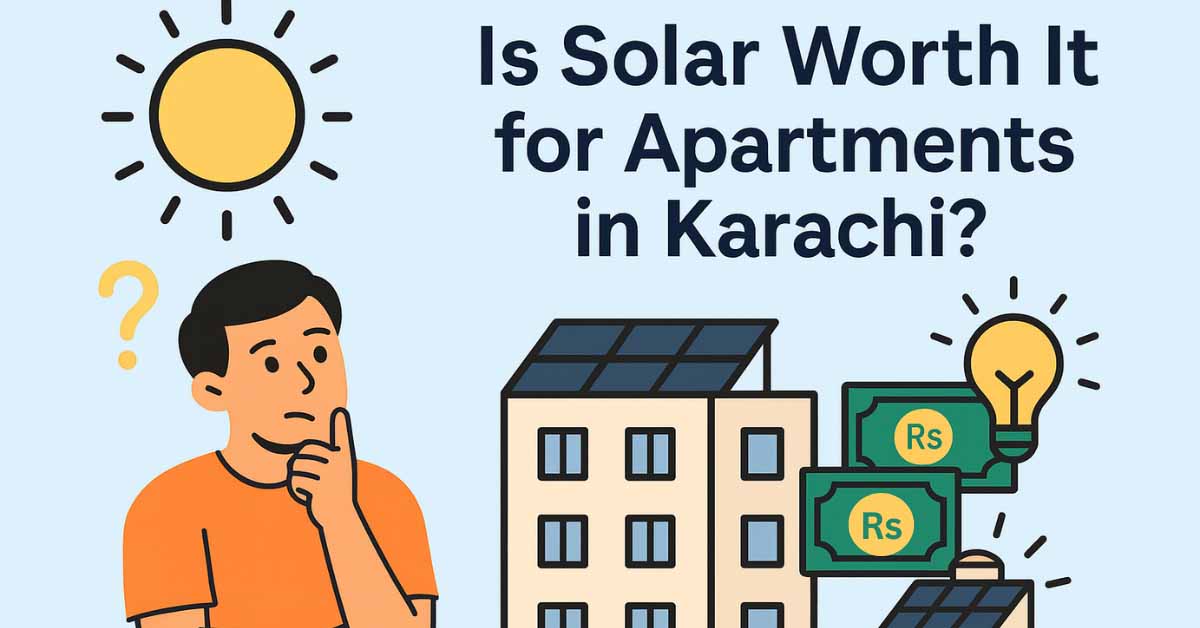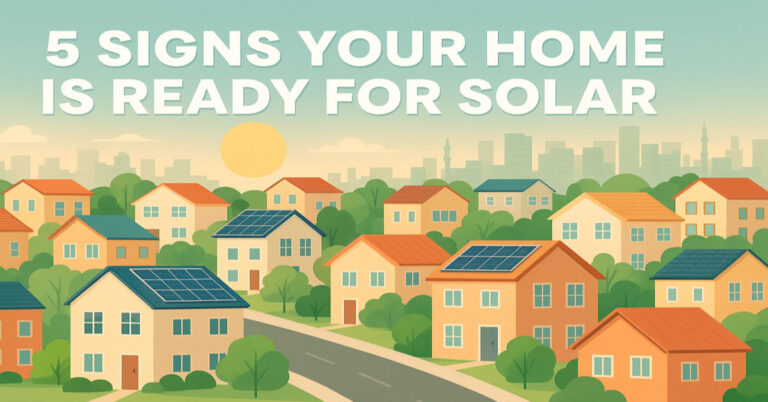Living in apartments in Karachi presents various challenges, particularly rising electricity bills and frequent load shedding.
As solar energy gains popularity in 2026, many apartment residents are contemplating:
“Can I actually install solar panels in an apartment?”
“Is it even worth it?”
Let’s break it down, no technical jargon, no false promises.
Can Solar Panels Be Installed on Apartments in Karachi?

Installing solar panels in apartment buildings across Karachi is possible, but it’s not always simple.
It depends on a few key factors that can make or break the project. Unlike houses with private rooftops, apartments often come with shared spaces, limited wiring flexibility, and extra permission layers. That’s why planning is so important.
Here are the main factors that determine if you can install solar in your apartment:
Rooftop Access:
You need permission from the building management or all flat owners if it’s a shared space.
If you live in a flat with a private roof (like a penthouse), you’re in a better position.
But in most cases, you’ll need written consent from your apartment association or landlord to legally use rooftop space for solar.
Structural Load Capacity:
The roof must be strong enough to hold panels and mounting frames. Some older apartment buildings in Karachi may not meet the load-bearing requirements.
A qualified solar installer can assess this and suggest any necessary reinforcements before installation.
Wiring Access to Your Unit:
Clean and dedicated wiring routes are necessary from the roof to your apartment. Multi-story apartments may not have easy pathways for safe and compliant wiring.
You may also need permissions for core drilling or cable trays, depending on your building’s setup.
Pros and Cons of Apartment Solar

Before you decide to move forward with solar, it’s important to understand both the advantages and the challenges.
Apartment setups are unique, and what works for one resident might not work for another.
Here’s a quick overview to help you weigh the pros and cons:
| PROS✅ | CONS❌ |
|---|---|
| Low Electricity Bills | Limited or no rooftop access |
| Net Metering can still apply | Requires NOC from the building association |
| Great return on investment (ROI) | Can’t benefit from solar if renting |
| Reduces dependency on K-Electric | System sharing issues with neighbors |
What Are Your Options?

1)Shared Solar System (for all apartments)
If your building committee agrees, the entire rooftop can be used for a central solar system that offsets energy use for common areas or all residents.
Note: Net metering can be applied here, but it needs one unified KE meter setup.
2) Individual Solar for Your Apartment (with exclusive access)
If you own a penthouse, top-floor flat, or have access to a private roof, you can install a system just for your unit.
However, even if you don’t have a private roof, you can install solar as long as you get official permission from your building committee or association.
In many buildings, some residents have successfully arranged exclusive usage of a portion of the roof through mutual agreement and formal documentation. This makes solar possible without full ownership of rooftop space.
3) Balcony Solar Panels (limited but helpful)
Some users in Karachi have experimented with micro solar systems: small panels placed in balconies or windows to run fans, lights, or charge batteries.
Although these don’t generate much energy, but can lower daytime consumption.
Is It Financially Worth It?

Absolutely, but only if the setup is right for you. The financial value of installing solar in an apartment depends on a few key factors: system size, energy usage, upfront costs, and your ability to get net metering.
Estimated Installation Cost (for 2026 in Karachi):
| System Size | Cost Range |
|---|---|
| 3kW System | Rs 500,000–600,000 |
| 5kW System | Rs 800,000–900,000 |
| Hybrid Battery Backup | Rs 150,000–250,000 |
Note: These prices can vary depending on panel brand, installer reputation, and roof complexity.
Monthly Savings:
Your monthly savings with a solar system depend on how much electricity you use and how well your system matches your load.
For most medium-sized apartments in Karachi:
| System Size | Avg Monthly Savings |
|---|---|
| 3kW System | Rs 7,000–10,000/month |
| 5kW System | Rs 15,000/month or more |
These savings are most noticeable during the summer months when AC usage is high.
Even with smaller systems, you’ll see significant reductions in your K-Electric bill, especially during daytime hours when solar is most active.
Note: With net metering, any excess electricity you produce can be fed back to the grid, further lowering your bill or even earning you credit.
Return on Investment (ROI):
Your return on investment timeline depends on system size, whether you include batteries, and if you’re approved for net metering:
- Without batteries and with net metering: ROI in 3–4 years
- With hybrid (battery-supported) systems: ROI in 4–5 years, depending on battery use and backup needs
After breaking even, you enjoy free electricity for the remaining 15–20 years, with only minor maintenance costs like cleaning and occasional inverter checks.
Solar panels have a lifespan of 25+ years, and most inverters last around 10 years before needing replacement.
If your apartment qualifies and you’re staying long-term, you’ll continue saving for 15–20+ years with minimal maintenance costs.
What if You are a Tenant?

Just because you’re renting doesn’t mean solar is off the table. More tenants in Karachi are exploring creative ways to tap into solar energy, without needing to own the roof.
Here’s what you can do:
- Use balcony panels or portable solar kits to run small appliances like fans, lights, or charge batteries. These are plug-and-play systems and don’t require heavy installation.
- Convince your landlord to install a solar system, especially if you’re a long-term tenant. You can offer to co-invest or pay a slightly higher rent in exchange for lower electricity bills.
- Work with other tenants to propose a shared rooftop solar system to the building committee. If there’s enough interest, the cost can be shared and net metering benefits divided fairly.
While tenants may not have full control over solar setup, they do have options if their building management is forward-thinking.
Final Thoughts: Should You Go Solar in Your Flat?

Solar isn’t just for bungalows anymore.
In 2026, apartment owners in Karachi can also enjoy the benefits of solar with a little creativity and cooperation.
If you’re serious about reducing your bill, then yes, it’s worth exploring.
☞️ Need Help Planning Your Apartment Solar Setup?

Solar Karwan is here to guide you at every step honest advice, a smooth process, and real savings.
Ready to get started? Just give us a call at 📞 +92-324-2214498 — we’ll guide you every step of the way!



